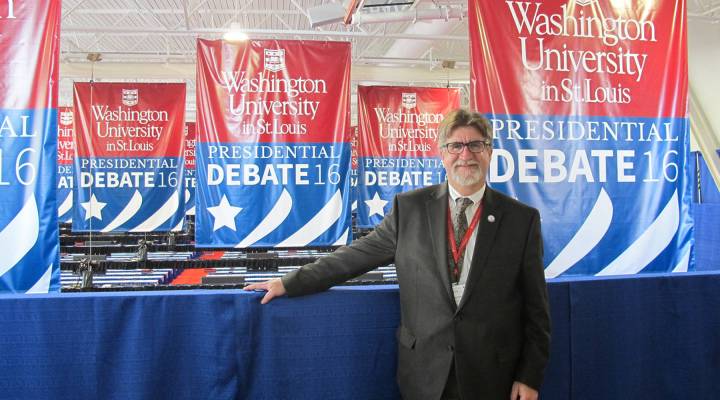
The cost of hosting a presidential debate
Share Now on:
The cost of hosting a presidential debate

Washington University in St. Louis looks a little different to students these days.
A 10-foot-high wire fence has sprung up around the school’s athletic complex. Security is ramped up, so everyone is carrying their IDs on lanyards around their necks. Media from the likes of CNN and MSNBC are everywhere, and little golf carts traverse the grounds.
The university is hosting the second presidential debate on Sunday, an event expected to attract 80 million viewers. There’s a lot of enthusiasm — and money — involved.
“It’s just a ball of excitement,” said Haley Dolosic, the president of the school’s Graduate Professional Council. Dolosic is part of a committee that decided which student groups would receive $100,000 in funding for debate- and election-related activities leading up to the debate.
Even as the debate buzz builds, students expressed mixed feelings over the costly endeavor. Washington University expects to spend up to $5 million to host the event.
“It’s costing a lot of money, and students can’t access facilities like the athletic complex. Some students are feeling like it doesn’t affect them because they can’t get in, but you have to look at both sides,” said Noa Yadidi, the editor-in-chief of student newspaper Student Life.
Hosting a presidential debate can often raise the profile of a university. In the case of Longwood University, the site of this week’s vice presidential debate, the school thought the event’s price tag – $5.5 million — was well worth the exposure. Center College, which hosted the 2000 and 2012 vice presidential debates, found that the exposure brought in donations and a more diverse student body.
Steve Givens, chair of the presidential debate steering committee at the university, said there isn’t money to be made, and that while the visibility is nice while it happens, it doesn’t really last. It’s more about giving students the experience of participating in a major political event, he said. The campus has hosted multiple presidential and vice presidential debates, starting with the 1992 debate with Bill Clinton, George H.W. Bush and Ross Perot.
“The real reason that we do this is maybe they leave here a little more civically engaged, a little more politically active, because we gave them an opportunity to be right in the middle of this,” Givens said during a walk through of the debate site.
Yadidi is certainly finding herself, and her peers, more engaged as a result. On debate night, she will be managing the organized chaos from her newsroom. Three members of her staff have their press credentials and will be reporting from the debate hall, alongside the other 3,000 members of the media expected to cover the event.
“It’s a once-in-a-lifetime opportunity for us. None of us have ever covered a national event like this,” she said.
Not all students will have access. The school only has access to a limited number of seats — Givens estimated that it will likely be around 100 — but it’s reserving them for students. The campus is distributing the tickets via lottery.
Kiara Sample, a junior on Washington University’s task force on race, identity and social justice, said she wasn’t able to get a ticket. Sample is also involved with STL Students in Solidarity, a group formed in the aftermath of Ferguson, to address economic and racial disparities.
“The money could have been spent in better ways,” she said. Sample would have preferred the university invest instead in the community around it, which, she said, it feels very removed from.
“Washington University is in a bubble, there’s this huge institution and then right down the street there are abandoned houses,” she said. “It’s not necessarily that they would gain anything tangible, it’s more of a moral responsibility.”
But is she more civically engaged because of the debate’s presence on her campus?
“Since I’ve already made up my mind — it’s kind of sad to say this, but it’s a show,” said Sample, who is voting for Hillary Clinton. “It’s just entertainment.”
Correction: The original article misspelled Steve Givens name. The text has been updated to reflect the correct spelling.
There’s a lot happening in the world. Through it all, Marketplace is here for you.
You rely on Marketplace to break down the world’s events and tell you how it affects you in a fact-based, approachable way. We rely on your financial support to keep making that possible.
Your donation today powers the independent journalism that you rely on. For just $5/month, you can help sustain Marketplace so we can keep reporting on the things that matter to you.


















